This hi-tech farmer promotes hydroponics and reaps a turnover of Rs 2 crore
11-August-2017
Vol 8 | Issue 22
As you enter the greenhouse located on the rooftop of a two-storey building in Chennai, you are greeted by the pleasant sight of rows of green plants growing out of pipes filled with just water – and no soil.
Growing in a protected environment, the leaves are thick, lush green, and free of dust particles, giving them a clean and healthy look. You find Italian and Thai basil, ajwain, brahmi, pudhina, and bok choy plants in this green hub.
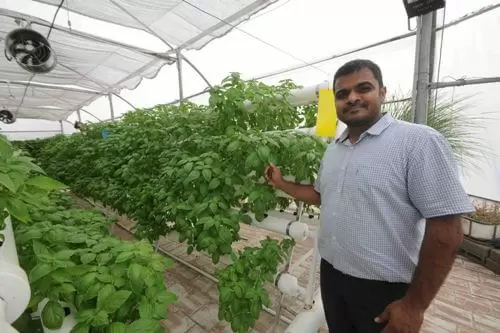 |
|
Sriram Gopal's second start-up in the nascent field of hydroponics is showing positive signs of growth (Photos: H K Rajashekar)
|
Welcome to the futuristic world of soilless farming, where it is possible to be an urban farmer and grow vegetables for both domestic and commercial purposes in a controlled environment with just nutrient-enriched water.
Hydroponics, as the technology is called, is gaining popularity globally and a start-up in Chennai, Future Farms, has joined the bandwagon.
Showing us around their rooftop farm, Sriram Gopal, 34, its CEO and founder, is pretty charged up by the pace in which they are growing. Future Farms achieved a turnover of Rs two crore in 2016-17 and seems set to triple its revenue in the current fiscal year.
“We are growing at 300 percent each year,” says Sriram. “In 2015-16 our turnover was Rs 38 lakh, and it was Rs two crore last year. We hit two crore in the first quarter itself this fiscal, and hope to finish at Rs six crore this year.”
In the current scenario of depleting water resources world over, hydroponics appears to have an advantage over traditional farming since it reportedly consumes about 90 per cent less water, requires no pesticides, and provides better yield.
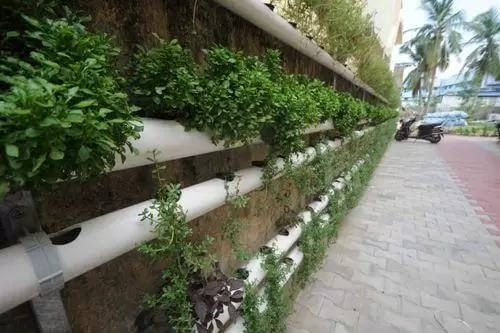 |
|
Hydroponics technology is also used for ornamental purpose. A scene outside Future Farms office in Chennai
|
A report by Transparency Market Research estimates that “the global hydroponics market is likely to be worth US$ 12,106.5 million by the end of 2025 from US$ 6,934.6 million in 2016.”
For Sriram, who was heading a successful IT company that he founded in 2007, hydroponics appeared to be an attractive proposition, given his flair to take risks and explore new technologies.
Around five years ago, after watching a You Tube video on hydroponics a friend had shown him, he started doing his own experiments with soilless cultivation in the vacant land at his father’s now defunct factory in Perungudi.
His father, A Gopalakrishnan, ran a factory that manufactured photo processing and printing machines until he decided to shut down the unit around 2007 due to his ill health.
“We were the only Indian company making these machines like Kodak and Fuji. In those days photo labs used to import second-hand Fuji and Kodak machines for Rs 20-22 lakh. But the same type of machine developed by my father cost just Rs 7 lakh and several labs purchased from us,” says Sriram.
His father also owned a chain of colour photo labs. Even from his pre-college days he was fond of repairing high-end cameras. So, after completing his electricals and electronics engineering degree from BITS, Bangalore, he decided to start a camera repair shop in Chennai.
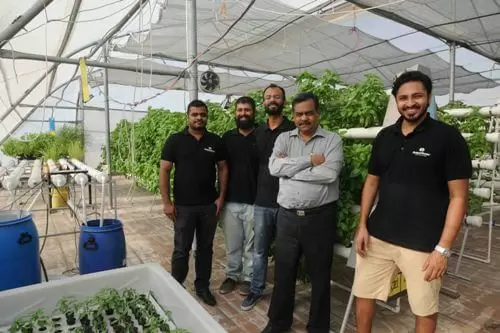 |
|
Sriram with his team members at their rooftop farm in Chennai
|
Gopalakrishnan’s business kept growing and reached a stage when he employed around 300 people at his factory and photo labs.
“But he was not good at marketing and did not promote his photo processing machine well. Whatever business he got was through word of mouth, which got me interested in marketing at a young age,” says Sriram, who did his electronics and communications engineering from Hindustan University, Chennai, and went on to do his masters in marketing and strategy from Caledonian Business School, UK.
However, one valuable lesson he learnt from his father was to always stay ahead of the curve. His father competed with the likes of Kodak and Fuji, but managed to carve a niche for himself in the market.
“He offered a good product at a low cost without compromising on quality. I also learned that you have to be in tomorrow's business and not today's. Because if it is today's business and it’s good enough, the big guys will take over. If it’s not (good enough), you will stagnate,” he shares his business philosophy.
It was this thought that made him search for business opportunities even though the IT consulting company he started in 2007 in Chennai soon after he returned from the UK after completing his MBA was doing well.
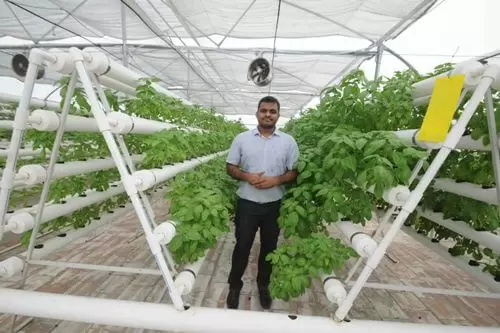 |
|
Sriram has made one of the directors of the IT Consulting company he founded as CEO so that he could give his time and energy to Future Farms
|
“I started the company with three others. Each of us invested around Rs 5 lakh in the venture in parts over a period of two years. Today, Synamen Thinklabs Private Limited is sitting pretty with a turnover of about Rs 2 crore,” reveals Sriram.
As the company was growing, the other directors were averse to taking high risk and preferred to play it safe. Synamen’s rate of growth was slow, but business grew automatically and Sriram had little role to play, which made him restless and eager to look for new challenges.
That’s when Sriram stumbled on hydroponics, and pounced on the opportunity. “I made one of the other directors CEO of the company (where he still holds 68 percent stakes) and began to focus on hydroponics,” says Sriram.
It started initially like a hobby about five years ago. “I started doing some DYI (do-it-yourself) things. I imported some items (hydroponics kits), broke it open, and started examining the gully (or channels), the pumps, controllers and the different instruments for checking water quality,” recalls Sriram.
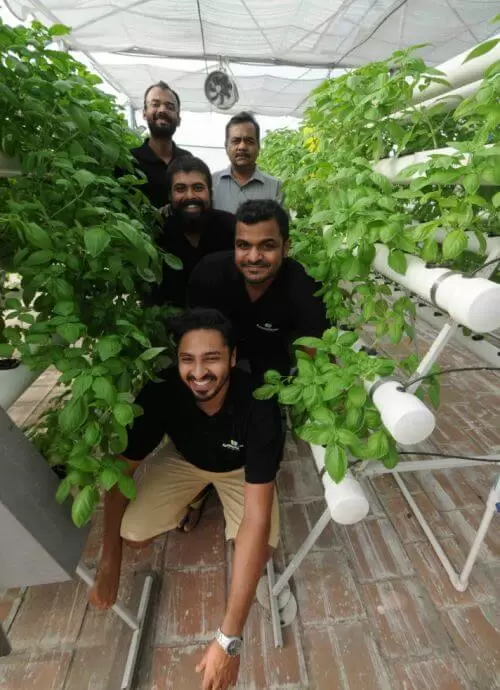 |
|
The team at Future Farms comprises a bunch of highly qualified, young, and passionate professionals
|
Soon, he acquired the distributorship of a foreign company and began to sell their hydroponics kits in India. “I got myself listed in online sites, but didn’t get many sales because the kits were quite expensive,” he says.
But that marketing activity connected him with likeminded people, many of whom belonged to his age group. These were well-qualified people, from diverse backgrounds, and all of them wanted to try something new.
“They were a bit crazy like me. I thought these were the kind of people I needed for my company,” laughs Sriram. Eleven came on board, and each of them was skilled, well-travelled and had the fire in the belly.
One was a biotechnologist who had left his job at a large hydroponics company in UAE. Another had worked in a hydroponics farm in Thailand for one and a half years and was looking for a suitable opportunity in India when he met Sriram. One week later he too joined his team.
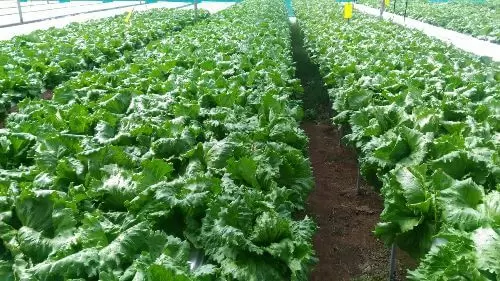 |
|
Iceberg Lettuce at the hydroponics farm in Kotagiri (By Special Arrangement)
|
But the most awesome part is, Sriram got the best brains on board not by offering fabulous salaries to them, but by getting them to invest in his company, which is a proprietorship currently.
“We have invested close to Rs 2.5 crore in the business so far. The 11 who have joined my team have invested around Rs 10 to Rs 15 lakh each. They would be allocated shares in the company which is going to become a private limited soon,” says Sriram.
None of the stakeholders takes a fixed salary, but their earnings depend upon the company’s revenue each month. This rule applies to only the 12, including the founder, but not the rest of the 40-member team
The company currently sells hydroponic kits on its website for prices ranging from Rs 999 to 69,999, with shipment charges extra. They also set up hydroponic units on turnkey basis.
It would cost around Rs 1 lakh to set up a 200 sq ft hydroponic farm, and anywhere between Rs 1 - 10 lakh for a farm of 200-5,000 sq ft size. Sriram says the ROI (Return on Investment) will be within 24-30 months.
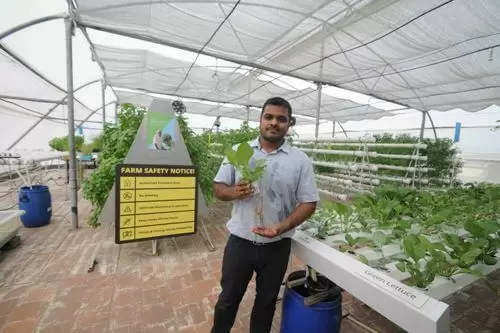 |
|
Sriram believes that hydroponics is the answer to the agrarian crisis in the country
|
He agrees that the challenge lies in finding the market for the produce, but as of now has found clients who are already growing medicinal and other plants for commercial purposes.
The company has set up quarter acre farms for Adani group in Bhuj, and a farmer in Kotagiri, who cultivates iceberg lettuce for McDonald’s.
Sriram is pinning his hopes on an urban farming revolution, where the new-age farmers would be people who would be comfortable handling the computers and sensors that are part of the hydroponic set-up, and rooftops in the cities would be the harvest fields.
Sriram got married in 2011, and his wife Preeta Suresh is a graphic designer who studied at National Institute of Design, Ahmedabad. The couple has a two and a half year old daughter.
This Article is Part of the 'Super Startups' Series
MORE SUPER STARTUPS
Abhay Hanjura and Vivek Gupta, Founders, Licious
Dhruv Ratra, Swati Vyas and Rahul Bhatnagar, Founders, Cubical Labs














